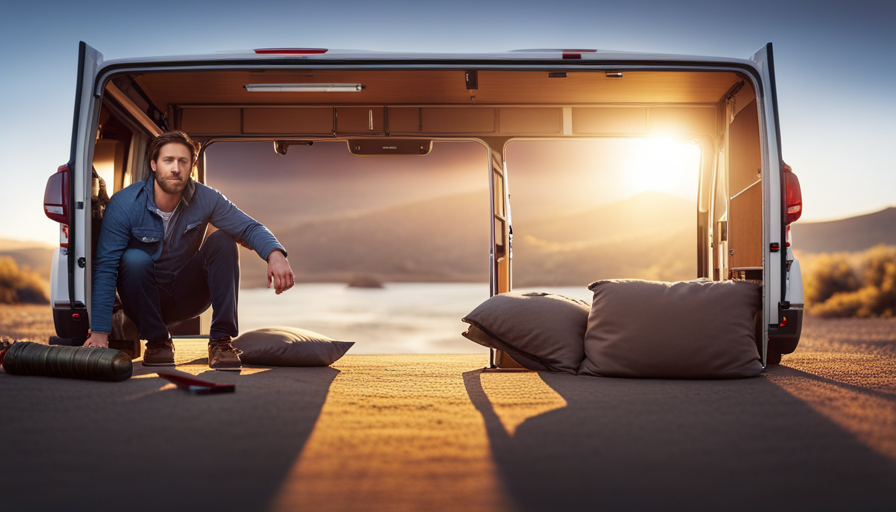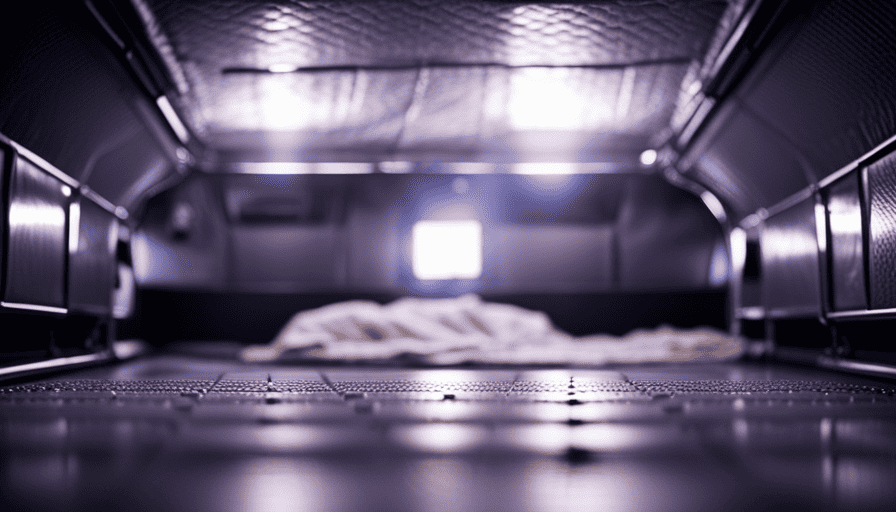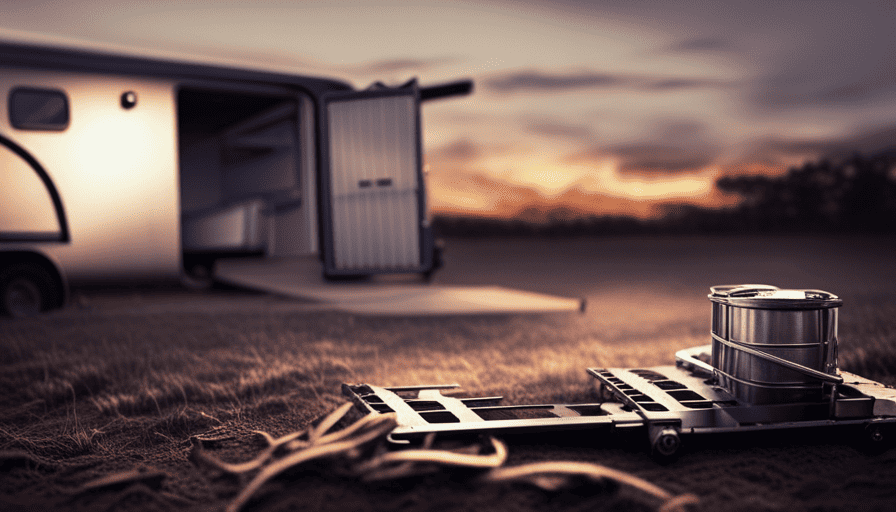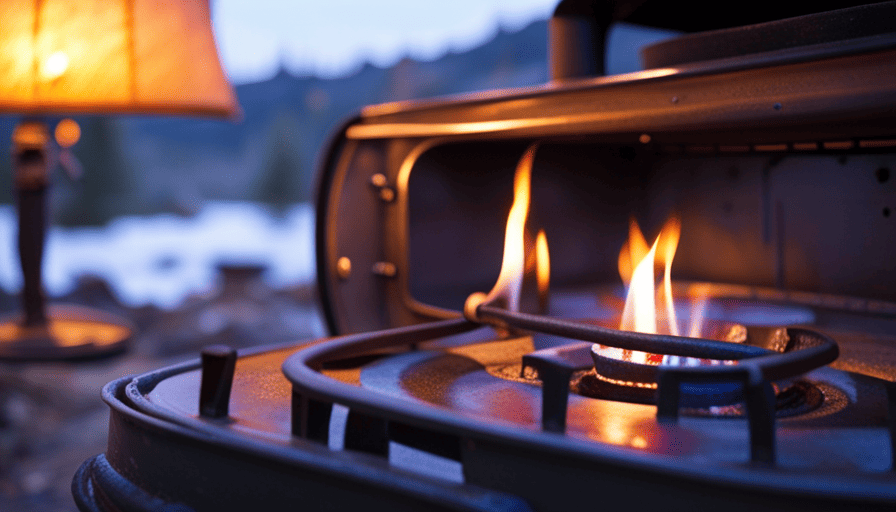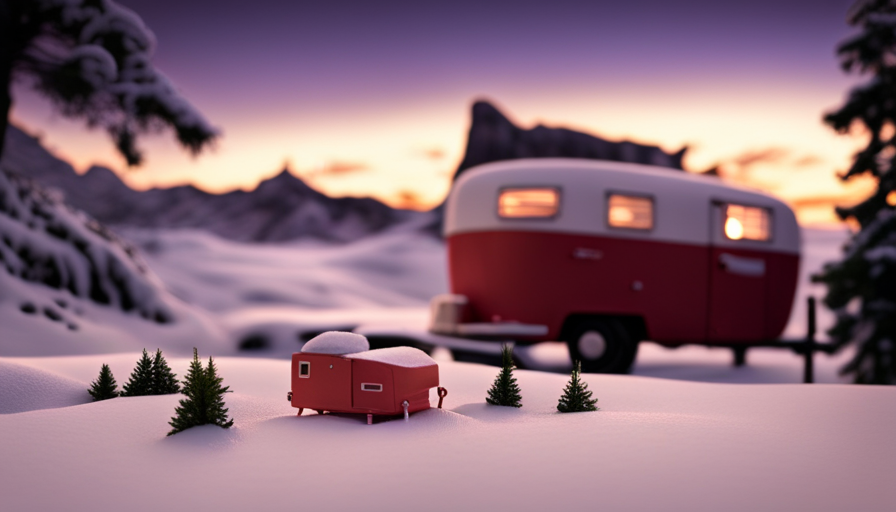Are you ready to hit the open road and embark on a customized personal adventure? Converting a van into a camper is the perfect way to create a mobile home that reflects your unique style and meets your specific needs.
But before you can start dreaming about the breathtaking landscapes and endless possibilities, it’s essential to understand the costs involved in this exciting endeavor.
Like a sculptor shaping clay into a masterpiece, converting a van into a camper requires careful planning, meticulous attention to detail, and a dash of creativity.
From choosing the right van and designing your layout, to purchasing equipment and considering safety and legal requirements, every step plays a crucial role in bringing your vision to life.
While the cost of converting a van into a camper can vary depending on factors such as the size of the van, the extent of the conversion, and the level of customization desired, this article will guide you through the process and help you set realistic expectations for your budget.
So, buckle up and let’s dive into the exciting world of van conversions!
Key Takeaways
- Converting a van into a camper offers a personalized and adventurous experience on the road.
- It is crucial to understand the costs involved in the conversion process before starting.
- Choosing the right van involves considering factors such as size, mechanical condition, layout, and fuel efficiency.
- Planning the camper layout and design includes selecting flooring, incorporating solar power, and considering furniture placement and functional spaces.
Choose the Right Van for Your Conversion
When you’re ready to embark on your van-to-camper conversion journey, it’s crucial to select the perfect van that’ll become your cozy home on wheels.
There are a few van conversion tips to keep in mind when choosing the right van for your conversion project. First, consider the size of the van. Do you need a larger van for more living space or a smaller one for easier maneuverability?
Next, think about the van’s mechanical condition. It’s important to choose a van that is reliable and in good working order to avoid any unexpected breakdowns on the road.
Another factor to consider is the van’s layout. Look for a van with a layout that suits your needs and preferences. Some common van conversion mistakes include not considering the height of the van, which can limit your living space, or choosing a van with windows that are difficult to cover for privacy.
Additionally, think about the van’s fuel efficiency to keep your travel costs down.
Now that you’ve chosen the perfect van, it’s time to plan your camper layout and design.
Plan Your Camper Layout and Design
Design your ideal layout for transforming your van into the perfect home-on-wheels, allowing you to create a personalized and functional space that reflects your unique style and travel needs.
When planning your camper layout and design, consider the following:
-
Camper Van Flooring: Choose a durable and easy-to-clean flooring option that can withstand the wear and tear of your adventures. Options like vinyl or laminate flooring are popular choices due to their low maintenance and ability to handle spills and dirt.
-
Solar Power Installation: Incorporating solar power into your camper van can provide you with the freedom to camp off-grid and reduce your reliance on traditional power sources. Consider installing solar panels on the roof of your van to harness the sun’s energy and power your appliances and electronics.
When designing your layout, take into account the placement of furniture, storage solutions, and functional spaces such as a kitchenette or bathroom. Think about your daily routines and how you want to utilize your space efficiently.
By carefully planning and considering every detail, you can create a camper van that meets your needs and enhances your travel experience.
Transitioning into the next section about determining your budget and setting realistic expectations, it’s important to consider these factors alongside your layout and design choices.
Determine Your Budget and Set Realistic Expectations
Creating your dream home-on-wheels requires careful budgeting and setting realistic expectations to ensure that your vision becomes a reality without breaking the bank. Budget planning is a crucial step in converting a van into a camper, as it helps you determine how much you can afford to spend on the project.
Consider all the expenses involved, such as purchasing the van, materials, tools, and any professional help you might need. It’s important to be realistic about what you can achieve within your budget, as conversions can vary widely in cost depending on the level of customization and quality of materials.
Setting realistic expectations is equally important. Understand that converting a van into a camper takes time, effort, and some DIY skills. Don’t expect a perfect, luxurious camper right away. Instead, focus on the essentials and prioritize what’s most important to you. This will help you stay within your budget and avoid disappointment.
Once you have determined your budget and set realistic expectations, it’s time to research and purchase the necessary equipment and materials. By carefully researching your options and comparing prices, you can find the best deals and make informed decisions about what to buy.
Research and Purchase the Necessary Equipment and Materials
Now it’s time to start researching and buying all the equipment and materials you’ll need for your dream mobile home. When converting a van into a camper, there are countless options available in terms of equipment and materials. Here are some steps I took when researching and purchasing everything I needed:
-
Research options: The first thing I did was explore different options for each component of my camper. From solar panels to kitchen appliances, there are various brands and models to choose from. I spent time reading reviews, watching videos, and asking for recommendations from fellow van lifers.
-
Compare prices: Once I narrowed down my options, I compared prices to find the best deals. I checked both online retailers and local stores to ensure I was getting the most competitive prices. It’s important to note that quality shouldn’t be compromised for a lower price, as durability is crucial when living on the road.
-
Consider quality and durability: When comparing prices, I also paid close attention to the quality and durability of the equipment and materials. It’s worth investing in high-quality products that’ll withstand the wear and tear of constant travel.
Now that you’ve done your research and purchased the necessary equipment and materials, it’s time to consider whether to hire a professional or take a DIY approach to converting your van into a camper.
Consider Hiring a Professional or DIY Approach
If you’re hesitant about tackling the conversion yourself, consider the option of hiring a professional to ensure a seamless and high-quality transformation. Hiring professionals can save you time and stress, as they have the knowledge and experience to handle all aspects of the conversion process. They can help you navigate the complexities of electrical and plumbing systems, ensure proper insulation and ventilation, and provide expert advice on layout and design.
While hiring professionals may come with a higher price tag, it can be worth it for those who don’t have the necessary skills or time to dedicate to the project.
On the other hand, the DIY approach has its own advantages. Many van dwellers enjoy the satisfaction and pride that comes with doing the conversion themselves. It allows for complete customization and control over the process, and can often be more cost-effective. However, it requires a significant amount of research, planning, and hands-on work. DIYers must be willing to learn new skills, troubleshoot problems, and invest time and effort into the conversion.
Next, we’ll dive into the important steps of insulation and electrical system installation, which are crucial for creating a comfortable and functional camper van.
Insulation and Electrical System Installation
Hiring a professional or taking the DIY approach both have their advantages, but let’s focus on the crucial steps of insulating and installing the electrical system to ensure a comfortable and functional space.
When converting a van into a camper, it’s important to pay special attention to the insulation and electrical wiring. Proper insulation will help regulate the temperature inside the van, keeping it warm in the winter and cool in the summer. There are various insulation materials available, such as foam board, spray foam, and reflective insulation. Choose the material that best suits your needs and budget.
When it comes to the electrical system, it’s recommended to hire a professional unless you have experience in this field. Installing electrical wiring requires knowledge of safety precautions and local building codes. A professional can ensure that the system is properly installed and meets all necessary requirements. They can also help you determine the appropriate power supply, whether it be solar panels or a generator, based on your energy needs.
Incorporating an electrical system into your camper van allows you to have lighting, outlets, and appliances like a refrigerator or a small stove. It enhances the functionality and comfort of your space.
Now that we’ve covered insulation and electrical system installation, let’s move on to the next important aspect – plumbing and water system setup.
Plumbing and Water System Setup
Setting up the plumbing and water system in your mobile home transforms it into a fully functional and convenient living space. When converting a van into a camper, it’s crucial to have a reliable water source for drinking, cooking, and cleaning. Installing a water filtration system ensures that the water you use is clean and safe.
There are various options available, including carbon filters and UV sterilizers, depending on your needs and preferences.
In addition to the water filtration system, you’ll need to set up a greywater disposal system. Greywater is the wastewater generated from activities like washing dishes, showering, and doing laundry. It’s essential to dispose of greywater properly to minimize environmental impact.
One option is to install a greywater tank that can be emptied at designated waste disposal sites. Alternatively, you can use a greywater filtration system to treat the water and reuse it for non-potable purposes, such as flushing the toilet or watering plants.
With the plumbing and water system in place, you can now move on to furnishing your camper and finding storage solutions. Creating a comfortable living space with clever storage solutions will maximize the functionality of your mobile home.
Furnishings and Storage Solutions
Once your plumbing and water system are in place, it’s time to transform your mobile home into a cozy oasis by furnishing it with comfortable essentials and clever storage solutions that will make your space feel like a home away from home.
Furniture customization is key in maximizing the limited space of a van. Opt for multi-functional pieces, like a sofa that doubles as a bed or a table that can be folded away when not in use. Consider utilizing vertical space by installing shelves or cabinets that go all the way up to the ceiling. This will provide ample storage for all your belongings while keeping the floor clear.
To further optimize space, think outside the box when it comes to storage solutions. Utilize the back of doors or the sides of cabinets with hanging organizers or hooks. Install under-bed storage compartments or use storage ottomans that can also serve as seating. Additionally, consider using stackable containers or bins to keep items organized and easily accessible.
When it comes to furnishing your van, comfort is key. Invest in a quality mattress or foam topper to ensure a good night’s sleep. Add cozy blankets, pillows, and curtains to create a warm and inviting atmosphere. Don’t forget about lighting! Install LED lights throughout your van to create a bright and welcoming space.
Next, we will dive into the important topic of safety and legal considerations when converting your van into a camper, ensuring that you’re well-prepared for your adventures on the road.
Safety and Legal Considerations
To ensure a safe and legal road trip experience, you need to familiarize yourself with the necessary safety measures and regulations for transforming your mobile home. Safety regulations and insurance requirements are crucial aspects to consider when converting a van into a camper. By adhering to these guidelines, you can protect yourself and others on the road.
One important safety consideration is the installation of proper seatbelts. Make sure that all seating areas in your camper van have seatbelts that meet the required safety standards. Additionally, it is essential to install smoke detectors and carbon monoxide detectors to ensure a safe living environment inside the van.
To give you a better understanding of the safety requirements, here is a table summarizing some key safety regulations and insurance requirements for camper van conversions:
| Safety Regulations | Insurance Requirements |
|---|---|
| Seatbelt installation | Adequate coverage for personal injuries |
| Smoke and carbon monoxide detectors | Comprehensive coverage for the vehicle |
| Fire extinguisher | Proof of registration and licensing |
By following these safety regulations and insurance requirements, you can enjoy your custom camper van and hit the road with peace of mind. Now, let’s move on to the next section and explore how to fully enjoy your road trip adventure!
Enjoy Your Custom Camper Van and Hit the Road!
Now that you’ve taken all the necessary safety and legal considerations into account, it’s time to enjoy your custom camper van and hit the road! The possibilities for customization options are endless, allowing you to create a space that truly reflects your personality and travel needs.
From installing a cozy sleeping area to adding a fully functional kitchenette, you can tailor your camper van to suit your specific preferences. However, it’s important to remember that with great customization comes great responsibility.
Regular maintenance and upkeep are crucial to ensure that your camper van remains in top condition throughout your adventures. This includes routine checks of the engine, brakes, and tires, as well as regular oil changes and fluid top-ups.
Additionally, keeping your camper van clean and organized will not only enhance your overall travel experience but also prolong the lifespan of your vehicle. Regularly cleaning the interior, emptying waste tanks, and checking for any signs of wear and tear will help prevent any major issues down the road.
So, as you embark on your custom camper van journey, don’t forget to take the time to properly maintain and care for your vehicle. With the right balance of customization and upkeep, you’ll be well-equipped to enjoy countless memorable road trips in your one-of-a-kind camper van.
Frequently Asked Questions
How much does it cost to buy a used van for conversion?
Buying a used van for conversion can be a cost-effective option. While some may worry about the initial cost, it’s important to consider the long-term benefits and savings.
Used vans can be found at various price points depending on factors like age, mileage, and condition. By choosing a reliable used van and investing in a quality conversion, you can create your dream camper without breaking the bank.
What are the necessary skills required to convert a van into a camper?
To convert a van into a camper, several skills are required, along with specific tools. Firstly, carpentry skills are essential for building cabinets, beds, and other storage units.
Electrical knowledge is also necessary to install lighting, outlets, and a power system.
Basic plumbing skills are needed for installing a sink and water system.
Additionally, proficiency in insulation and interior design is crucial.
As for tools, you’ll need a range of equipment such as saws, drills, measuring tools, and a variety of hand tools.
Are there any specific regulations or permits required for using a converted camper van?
Yes, there are specific regulations and permits required for using a converted camper van. These regulations vary depending on the country and sometimes even the state or city.
Some common regulations include having a valid driver’s license, ensuring the vehicle meets safety standards, and obtaining proper insurance coverage. Additionally, there may be specific permits required for parking, camping, or using certain facilities.
It’s important to research and comply with the regulations and permits in your area to ensure a safe and legal camper van experience.
What are the maintenance requirements for a camper van?
Maintaining a camper van requires regular attention to ensure it remains in optimal condition. Some key maintenance requirements include regular oil changes, tire rotations, and brake inspections.
It’s important to check all fluid levels, such as coolant and transmission fluid, and replace them as needed. Additionally, regular inspections of the electrical system, propane tank, and water system are necessary.
Keeping up with these maintenance tasks will help ensure a safe and enjoyable camper van experience.
Can a camper van be used as a primary residence?
Living in a camper van as a primary residence has both benefits and challenges. On the positive side, it offers freedom, mobility, and a minimalist lifestyle. You can travel and explore new places easily.
However, there are challenges to consider as well. Limited space, lack of amenities, and the need for constant maintenance can be daunting. It requires careful planning, organization, and adaptability.
Despite the challenges, many people find the unique experience of living in a camper van to be rewarding and fulfilling.
What is the Cost Comparison Between Renting a Pop Up Camper and Converting a Van to a Camper?
When considering the cost comparison between renting a pop up camper and converting a van to a camper, it’s important to evaluate your specific needs. Renting a pop up camper can be a more affordable short-term option, allowing you to experience camping without a long-term commitment. However, converting a van into a camper can be cost-effective in the long run if you frequently embark on outdoor adventures. Ultimately, the decision depends on your budget, travel frequency, and desired camping experience.
Conclusion
After months of hard work, careful planning, and a bit of elbow grease, my van-to-camper conversion is finally complete. As I step back and admire the cozy interior, I can’t help but feel a sense of satisfaction.
The once empty van has been transformed into a mobile oasis, equipped with all the necessary amenities for a life on the road. Every inch of space has been utilized, creating a functional and comfortable living space.
Now, with the road stretching out before me like an open canvas, I’m ready to embark on my next adventure.

